|
|
|
|
LIVE AMAZING MIRACLE FRUIT TREE Seedling Edible Berry
Price: $24.99

|
MIRACLE_FRUIT
|
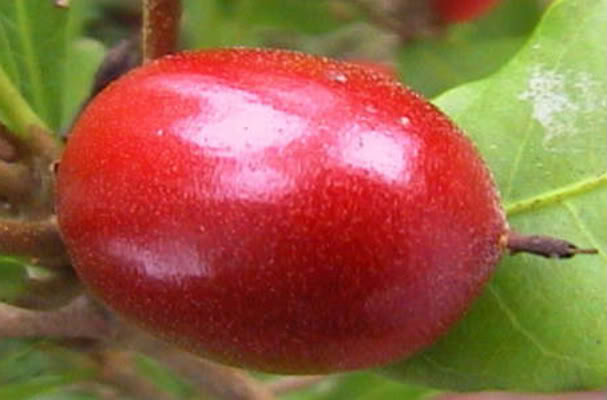 |
|
Have you
heard of Synsepalum dulcificum, the miracle fruit that turns sour into sweet!
(http://online.wsj.com/article_email/S...)
|
|
MIRACLE
FRUIT |
 |
|
Synsepalum
dulcificum Family: Sapotaceae
Native to Ghana (Tropical West
Africa)
a.k.a. Miracle Berry
You are bidding on
one OR MORE
small live seedlings with vigorous root systems 3-5 inches tall with * leaves born and grown in
Hawaii.
Ships as shown in pot.
use
this listing for multiple plants with max s/h discount.
FAMILY : Sapotaceae
TYPE/USES : evergreen shrub
SIZE : 6' - 12'
LIGHT REQUIREMENTS : filtered light
WATER REQUIREMENTS : average
MIN. TEMP. : low 30's
FLOWER : warmer months
|
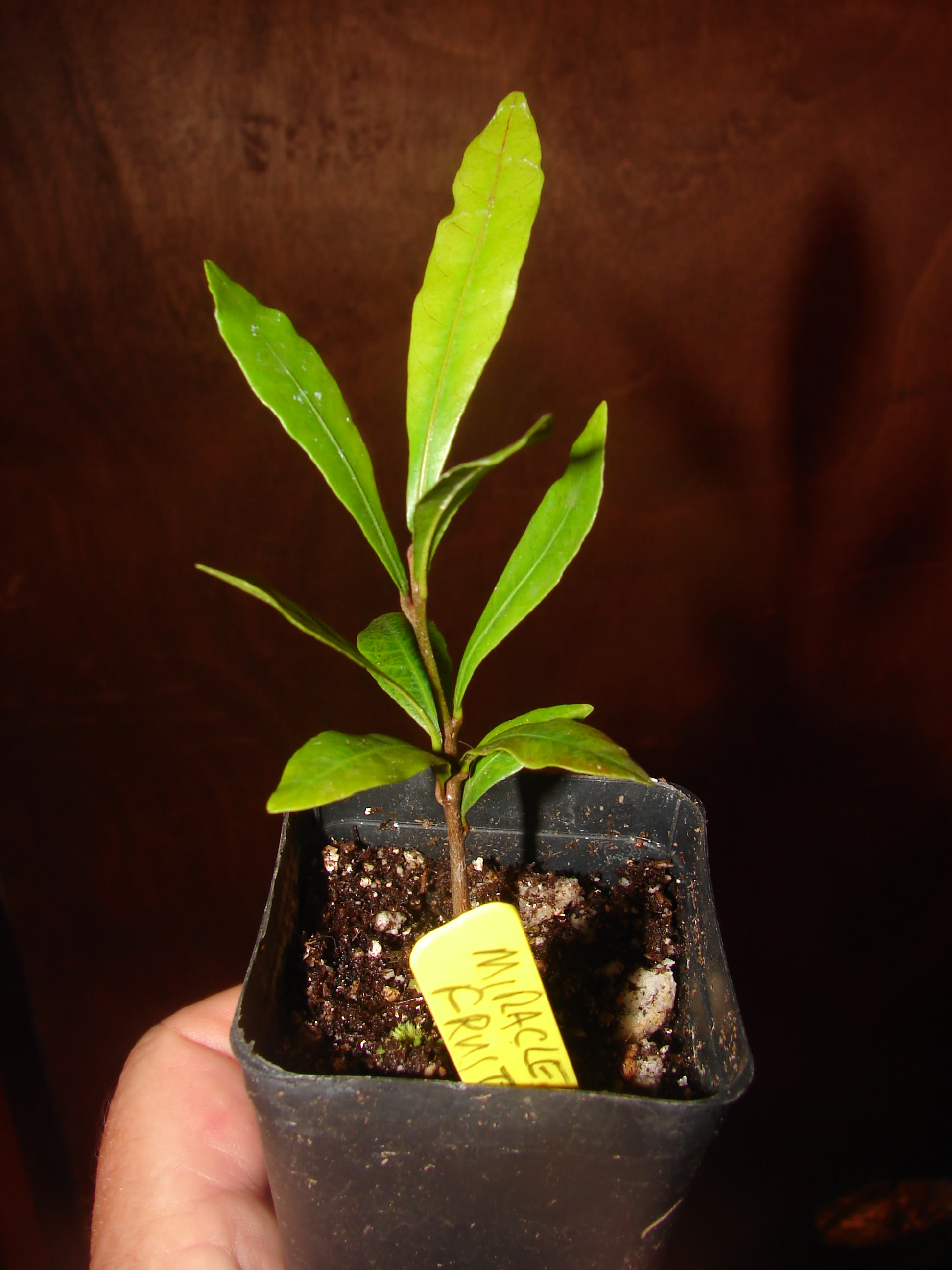 photo of similar item |
Miracle fruit is difficult plant to locate and is usually found only
in a collector’s garden.
http://www.nytimes.com/2008/05/28/dining/28flavor.html?ex=1213156800&en=a731f257c7cedbd7&ei=5070&emc=eta1
A relatively tasteless berry with an
amazing side-effect. After eating one miracle fruit, sour things will instantly taste
sweet. Eating even the sourest of lemons, one will taste only sugary sweetness. The effect
lasts an hour or two. The miracle fruit is a remarkable natural sweetener that is
virtually unknown to much of the world.
|
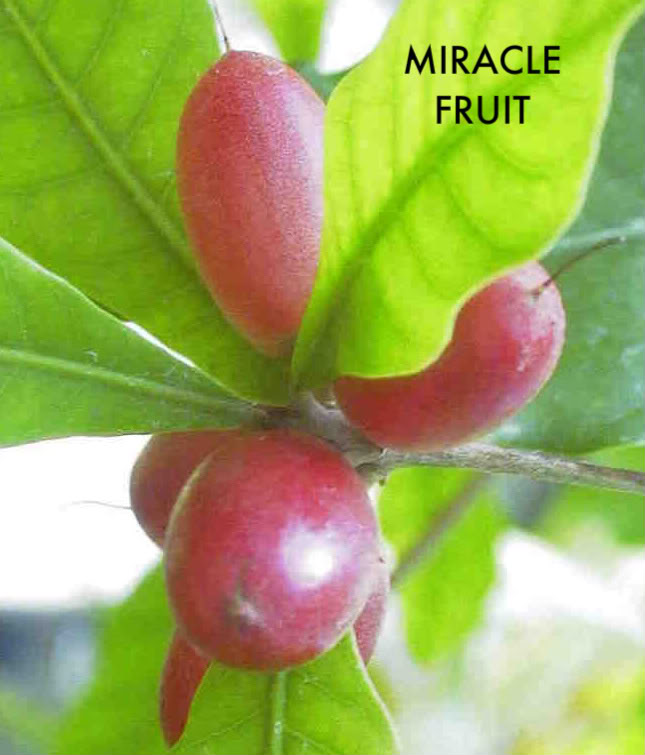 |
Miracle Fruit thrives best in partial shade. When plants are small they
are subject to frost damage, so they should be container-grown and kept
indoors or moved to protected locations when frost or freeze threatens.
Older plants may sustain some leaf and minor twig damage, but may
sustain cooler temperatures without being killed. Although not thought
to be frost tolerant, the synsepalum plants have been observed growing in Florida
in protected from wind locations as far north as Tampa.
There are 2
known species of synsepalum that carry miracle fruits. Synsepalum dulcificum is a
smaller-leaf version (leaves are narrow), and is somewhat slower growing plant.
Synsepalum
subcordatum (Giant Miracle Fruit) is a larger leaf variety, and grows into a small
tree. The fruit are slightly bigger than those of s. dulcificum, and are produced
more profusely, especially in first years. With age, the fruit crop amounts of these two
species become about the same.
|
This small, evergreen shrub grows very
slowly to a height of 4-6 ft in container, and 10-15 ft in natural habitat. Eventual size
depends on where the plant is grown; a 10 years old plant might be easily only 4-5 feet
tall. It forms an oval to pyramidal shaped bush or small tree.
Inconspicuous brown-and-white 1/2 inch flowers are
followed by bright scarlet, 1 inch football-shaped fruit, sweet and pleasant tasting. Most
of the fruit is taken up by a single large seed, but the pulp around it can be nibbled off
and then for the next hour or so, anything one eats that is sour has a sweet
flavor. The plant starts fruiting when only 1 ft tall. It produces fruit
practically year around. In native habitat, two large crops are available yearly, each
after a rainy season. The mature bushes usually have a few fruits hanging around all year.
Seed to fruit in 2 to 3 years. Flower to fruit in 30 to 45 days.
One of the many virtues of miracle fruit is its ease
of cultivation, although, like with any plant, it would be nice if you learn its likes and
dislikes before inviting it into your home or garden.
|
THE PLANT
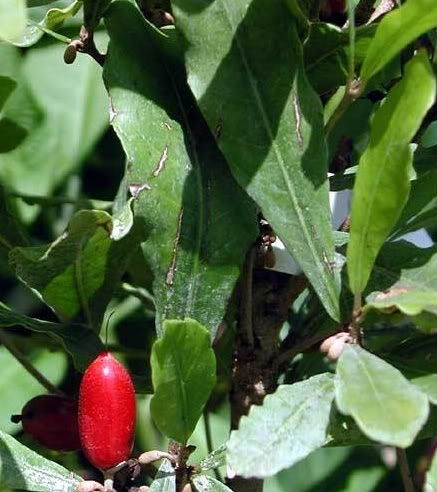 |
A slow
growing bush or small tree to 15ft. Needs acidic soil and is intolerant to alkaline
conditions. Will tolerate minimal frost when full grown, but needs lots of water year
round. The miracle fruit cannot be grown outside in the United States except Southern
Florida, but it makes an easy house plant. Fruit is produced throughout the year and
hundreds of berries can be harvested from a single plant. Fruit is produced throughout the
year and hundreds of berries can be harvested from a single plant.
Small
berry with tasteless flesh but an amazing side effect that will make sour things taste
sweet. The effect lasts for an hour or two. After eating a single miracle fruit, you can
eat a lemon raw without puckering! Small bush or tree, tropical, will survive slight
frosts. Easily container grown. Filtered light with some direct sun is good. Fertilize it
once a month with liquid fertilizer. Miracle fruit is not an indoor plant. A.C. and
heaters dry out the air too much for them. If you don't have experience growing tropical
plants indoors do some research on the internet for tips.
Avoid freezing temperatures.
|
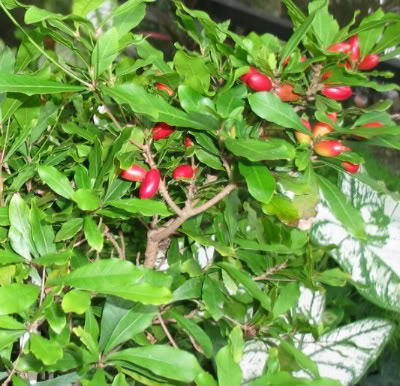 |
|
THE FUN, THE TRICKS AND
RECIPES
Many people are still unaware of this rare fruit and the effect it could have on enhancing
the quality of their lifestyle.
- Invite your guest to taste the small Miracle Fruit
berry, which is usually liked for its own sweet taste. Then offer them to taste a sour
fruit from your garden collection: lemon, calamondin, key lime, eugenia, amla or any other
sour fruit. They will be amazed at the "new variety’s" taste and will be
begging you for a cutting!
-
Offer the fruit and then a beer. It could kill beer
appetite for more than an hour and makes beer taste like a lemonade. Heavy beer drinkers
can take a brake!
-
Try to enhance the quality of other fruit. Enjoy the
delights of a bowl of tart strawberries! Lemons taste like lemon sherbet.
-
Miracle Fruit enhances flavor of grapefruit. A
heavenly breakfast will be provided by a single Miracle Fruit berry before your morning
grapefruit!
-
Organic acids - especially citric acid - are the
substances that are modified to the greatest degree. Battery acid will NOT become a tasty
drink.
Miracle Fruit is a great sweet enhancement for
dieters.
The unique properties of miracle fruit have been used
for an appetite stimulation of persons taking chemotherapy medicines to help them to
remove the metallic taste and return the desire for food.
There are no artificial sweeteners proven absolutely safe. Sugar and other
"natural" sweeteners are hardly to be considered as food with no ill effects.
Miracle fruit is a natural, healthy and harmless sweetener! Due to its safety, it may have
a great potential and practical use in everyday life and become a gift to humanity, a way
to improve our diets and our health.
Unfortunately heat destroys the active principle, so that canning, jams, preserves,
baking, drying, etc. are impossible. The fruits can be held for a short period of time by
refrigeration or freezing.
The fruits themselves are of interest as a commercial source of artificial sweetener;
however, large quantities of berries are needed to collect a substantial amount of the
sweetener. The problem is how to increase the shelf life of the product. The berries are
perishable, and once picked, last only a few days. Methods of shipment are not conducive
to marketing the fruits and commercial cultivation of the plants was unsuccessful so far.
|
Miracle fruit is one of the
strangest tropical fruits. The most unusual thing about it is the effect
it has on one's taste after this miraculous berry has been consumed. The
“miracle” is that if lemon or other sour food is eaten after the miracle
fruit, the sour tastes sweet, as if sugar has been added. That kind of
magical experience is unforgettable! The interest in this plant is so
high that anyone who has a plant always finds eager volunteers to test
its sweetening properties. A natural chemical in the fruit masks the
tongue’s sour taste buds so that lemons taste like lemonade or lemon
pie, or lemon candy. What causes the miracle? The fruit has a unique
taste changing glycoprotein that inhibits taste buds' perception of sour
taste. The sweet sensation lasts for half an hour to a few hours...
A BIT OF HISTORY
The
plant was discovered in West Africa, where the native diet revolved around a few basic
foods, mostly of sour taste. Just imagine the delight of the people when someone ate a few
red berries and later ate a meal of sour foods, to find everything suddenly sweet! The
West African natives use the fruit to sweeten sour palm wine (beer) -
Pito, and
fermented maize bread - Kenkey.
This West African wonder was not botanically identified and named until the middle of the
19th century as Synsepalum dulcificum, a member of the family Sapotaceae, relative of the
sapodilla (Manilkara zapota).
|
Miracle Berry
If planted in alkaline limestone based soils, the plant may die. These
plants seem to live for acid, thriving in it, and then converting it!
They must have rich, well-drained soils that are acid in pH, with lots
of peat moss, and require constant supply of micronutrients. On alkaline
soils they often are grown in large containers with generous amounts of
peat moss for sustained success in fruiting.
Miracle fruit makes an
excellent container tree, which gives it the added benefit of mobility.
Since it is so easily containerized, almost anyone can grow this plant whether they have
an outside planting area or not.
Miracle fruit can
be a rewarding indoor plant. It is not a fast growing plant, which is another
benefit for those who would like to grow it in their house or greenhouse. It thrives under
warm temperatures, and high humidity. A 10 inch plant is happy in a one gallon pot. One
that size will flower and fruit at least twice a year, probably more frequently.
Synsepalum
dulcificum
Family: Sapotaceae
Native to Ghana (Tropical West
Africa)
|
|
 |

 Polynesian Produce Stand
Polynesian Produce Stand

|
|
All good things take time, so
I grow my plants and rare palms in  my
ebay store. my
ebay store.
Much more to
check out or just get a little education on in my store.

|
|
|

 Shipping
Shipping

ATTENTION USA BIDDERS!
 All live plants are shipped bare-root wrapped in moist
sphagnum moss to ensure the plant’s healthy transit to you. All live
plants are Inspected By USDA Plant Inspectors before they are
shipped to insure you get healthy pest free plants and seeds. All live plants are shipped bare-root wrapped in moist
sphagnum moss to ensure the plant’s healthy transit to you. All live
plants are Inspected By USDA Plant Inspectors before they are
shipped to insure you get healthy pest free plants and seeds.
We ship via USPS Mondays-Wednesday with Delivery
confirmation.
All
plant materials are required by LAW to inspected and certified by
USDA prior to export Hawaii to the US Mainland.
After
Inspection, USDA stamps released for export Hawaii to the US
Mainland. All items are delivered to USDA Inspection Station at
Honolulu International airport.
USDA
Certification charge
is included in Shipping and Handling
@ $5 fee per
item/species. There is a
packing & custom boxing fee.
Last and
usually least is USPS postage (shipping).

ATTENTION INTERNATIONAL BIDDERS!
We can ship live plants to the US only. Only Domestic Shipping and Handling
includes USDA Certification.
We ship Seeds Internationally.
All International shipments are at Buyer's
Risk. Please spend no more more than you can lose!
Proper Permits and Documents are the
BUYER's responsibility.
Please request any documents prior to shipping.
For foreign customers, please check your laws concerning permitting and customs,
additional shipping and handling costs may apply.
The additional charge for any Phytosanitary Certificate is not included in this offer.
INTERNATIONAL SHIPPING ON LIVE PLANTS is available only under these conditions!
All international orders
are shipped at the
BUYER's RISK
(shipped with or without
documents) and no refunds or replacements are offered for Dead On
Arrival, loss, confiscation, Customs Seizure, unanticipated charges,
etc.

|

 Payment
Payment

We
accept online payments only through PayPal, Cash payments are only acceptable for
in-person payments and cash-on-delivery (COD). Cash payment can not be sent through the
mail.
Please only one Paypal payment. SO THE COMBINED SHIPPING RULE WILL CAN
BE USED. Multiple paypal payments are NOT eligible for
discounts.
We will ship once a week - ON or BEFORE WEDNESDAYS, because
of the special stamps needed to ship plants and cuttings to you. This can only be
done at the Dept. of Agriculture. If payments are not met before that MONDAY, your
items will be shipped the following week and lose the combined discount opportunity.
Non-paying bidders may receive negative feedback and will be reported as an unpaid item to
eBay.

COMBINED
SHIPPING POLICY
INTERNATIONAL
SHIPPING is not included in this offer.
See
INTERNATIONAL SHIPPING ON LIVE PLANTS
We will combine shipping for auctions won on the same week paid with same paypal payment.
This policy is good for all items bought and paid for in the week ending MONDAY.
Payment must be received
within 7 days of the auction ending.
Combined
Discounts Won Auctions
For 2-3 winning auctions, the combined discount is 10% of the total Shipping and Handling
charges. For 4-7 winning auctions, the combined discount is 20% of the total Shipping and
Handling charges. For 7+ winning auctions, the combined discount is 30% of the total
Shipping and Handling charges.

As each order is packed and prepared separately you will pay the quoted S/H charges
individually per item. If you buy the same species in that item it does calculate out the
discount (i.e.: additional item $3.61). My stores' combined shipping is built in for same
items rather than a varied selection. Includes postage, USDA certification and inspection,
proper packing and delivery to Airport for prompt delivery. I can’t really change any
of these. If you want one of this and one of that, it gets hard to discount much as each
different species requires it's own prep & packing, then at USDA each has to be
unwrapped and inspected then repacked. USDA requires me to clean and prepare every last
piece before we drive them to the Inspection Station on the other side of the island. It
takes my wife and I, a day to pack items and get ready to ship. The whole next day we
drive around the island and get inspected (2-3 hours), then drive to the Airport Post
Office to drop off. It takes the same work with the same type item if you can understand.

|
|
After you purchase |
After you Receive your Items. |
LIVE PLANTS ARE PERISHABLE.
For this reason uninsurable.
When you order a plant we assume you are prepared to care for it.
Please have potting media and a container prepared for your plant
before it arrives. Shipping can be stressful on a plant, and any
mistakes that you make upon arrival can stress the plant further,
which is not good. Proper care is critical upon arrival. It is your
responsibility to know how to care for the plant.
Not every plant that I order through
the mail survives, and I am aware of that and accept the risk when I
order. This is the risk that you as the buyer accept, because there
is no way to know what kind of conditions it will endure in the trip
to your door. My responsibility ends when a live plant is delivered
to your door. Live arrival is guaranteed, eternal survival is up to
you.
Do NOT email me a week after potting your plant, and make a claim it
arrived damaged. From delivery confirmation, you have only 48 hours from
delivery confirmation to make any claim.
|
All claims need to be supported with
Photos of the damaged plant(s) as packed/unpacked, the box if damaged,
the packing materials and any documents. I am very reasonable and
understanding, anything can happen to small plants in transit.
The expense to send it to you is most
of your payment. To send any replacement (s), I try to piggy back with
your next order.
Replacement is not an option for
CUSTOMS SEIZURE.
ALL OF MY ITEMS ARE SHIPPED USDA
CERTIFIED WITHIN THE U.S.-
USDA and USPS fees are included in the actual cost of shipping and
Handling.
Please do not leave a 1 or 2 in my
detailed seller ratings for postage fees or any reason really because I
will have to charge even more rather than to ship items the best way and
use the least expensive way. These are coming from Hawaii. The only
thing inexpensive here in Hawaii are my items!! I do ship all my items
promptly via best method--if you feel like the combined shipping fee is
wrong, please wait to be invoiced and check back with me-I value your
business and will work diligently to keep you satisfied. I am very
generous and reasonable with reasonable people, just ask.
|
 |
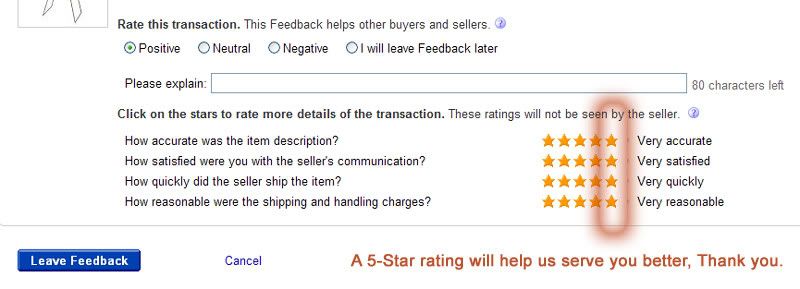 |

|
|


my
dog Taz will fetch your email to me
If you are dissatisfied
with the item, please contact me
before leaving a
negative or neutral comment.
I want you to be
satisfied.
Mahalo iâ `oe no ke kipa
`ana mai. E kipa mai hou!
Mahalo & Aloha!! |
Rare Palm Seeds
Fresh
Highest Quality
Seller warrants seed to be of the variety and quantity advertised.
Safe delivery is guaranteed and seeds lost or damaged during shipment will be replaced at
seller's expense. Claims must be made within 7 days of shipment. All other replacements,
refunds, returns and exchanges will be made at the sole discretion of the seller.
Seed is a live product which depends on many important related grower skills such
as proper planting time, seed depth, type of soil, irrigation, proper use of fertilizers,
weed controls, fungicides, insecticides, disease free soil, and reasonable weather
conditions during the growing period. Germination is affected by such factors as
temperature, moisture content, light intensity and contamination of planting media. These
factors are totally out of the seller's control and are the buyer's responsibility and
risk. Consequentially, the seller cannot unconditionally guarantee seed to perform
properly regardless of conditions or the buyer's methods or mistakes.
|
 |
|
|
|
Destination: United States |
|---|
|
| STANDARD | Standard | $0.00 | $0.00 | | Destination: Worldwide |
|---|
|
| STANDARD | Standard | $9.61 | $5.61 | |
|
Type | Instructions to Buyer |
|---|
| Paypal | null |
|

|
|